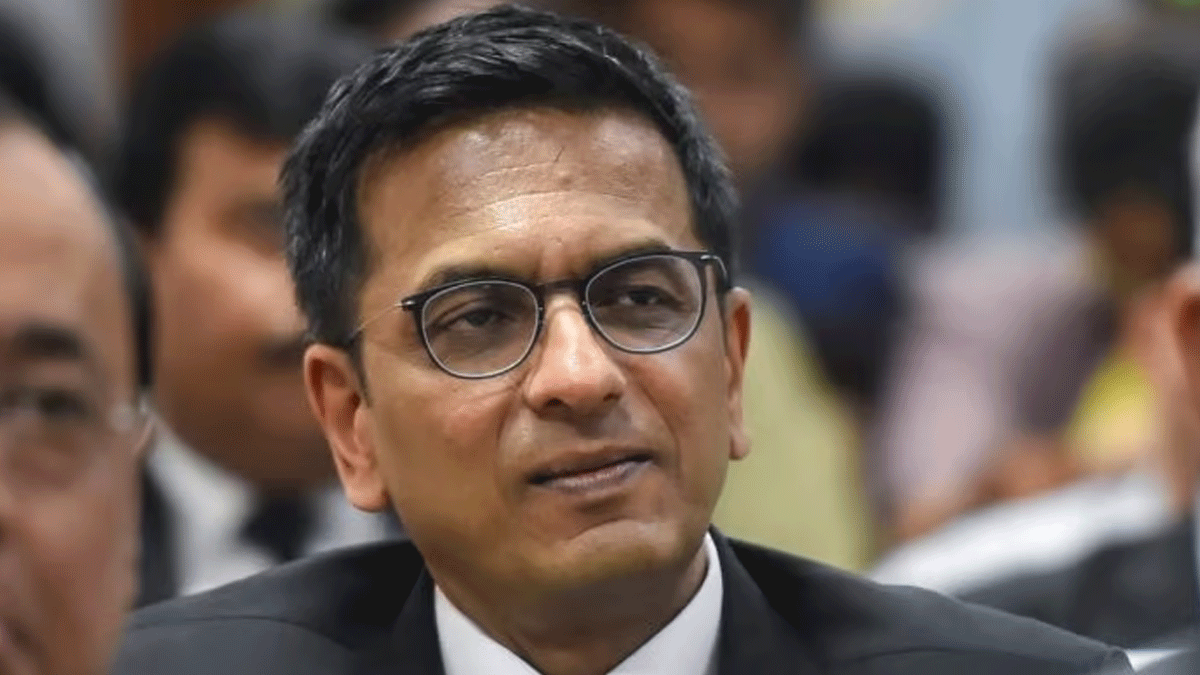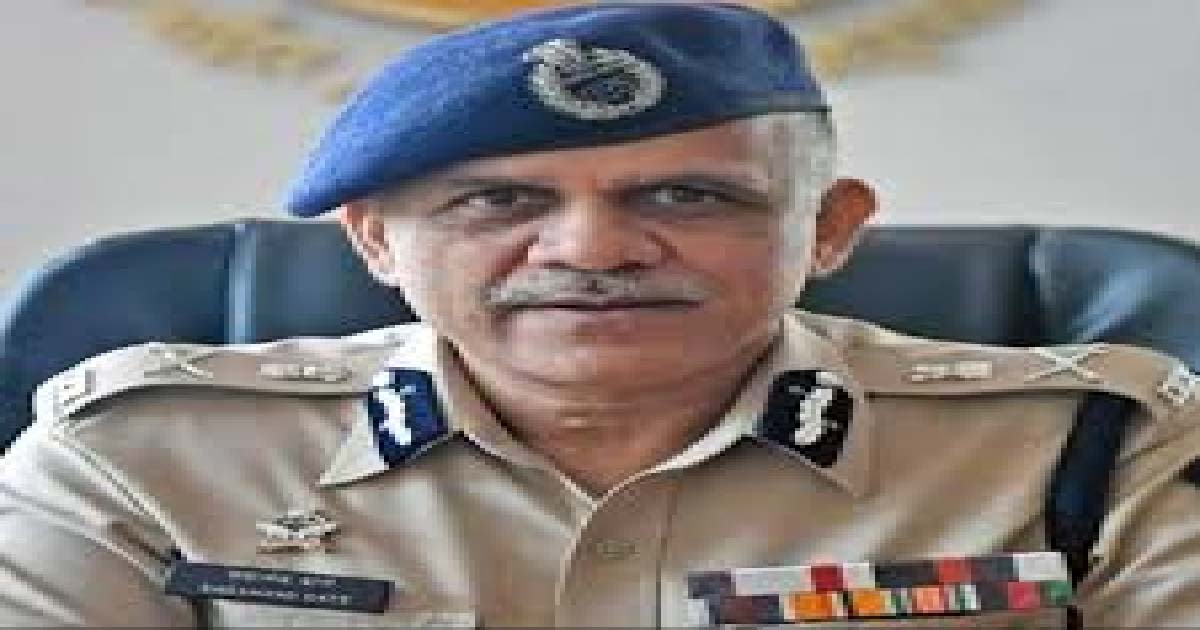Maharashtra
Mumbai: ‘There Is Constant Tussle About Controlling Appointment Of Judges,’ CJI Chandrachud

The tussle between the judiciary and the government over the appointment of judges was once again apparent on Friday when Chief Justice of India (CJI) DY Chandrachud breached the topic during the inauguration of the new premises of the Central Administrative Tribunal (CAT) bench in Mumbai.
CJI said that there is a constant tussle about who will control the appointment of judges even as the vacancies arise, and the recommendations are kept pending for a long period of time.
Importance of tribunals
Emphasizing the importance of tribunals in the country, CJI said one of its objectives is to battle the delays and help unclog the courts and aid overall in the dispensation of justice.
The tribunals, however, are plagued with problems, and we ask ourselves whether it is really necessary to constitute so many tribunals, the CJI said. “Because you do not get judges, when you get judges, vacancies arise which are kept pending for a long period of time…and then there is this constant tussle about who will get ultimate control over the appointment of judges,” CJI added.
Appreciating the work culture in Maharashtra, CJI said: “There is a culture of governance where the government successfully has left the judiciary alone. They do not tinker with the work the judges do. They accept outcomes that are favorable…they accept outcomes that are unfavorable because that is the culture of Maharashtra.”
The struggle to acquire space in the city
Highlighting the struggle to acquire space in the city, CJI said that every Mumbaikar would testify to the troubles of securing a space. “Very often we forget the importance of the work that the government does in aiding and supporting the judicial infrastructure,” he said, adding that the government played a proactive role in allotting a place for a new high court complex.
The CJI, who has been vocal for inclusivity, said that to make justice accessible to all, it is necessary to make courtrooms more accessible to differently-abled persons. He added that technology cannot become the sole medium to access justice, and physical access to courts can never be understated and hence must be constantly improved.
Stressing the importance of tribunals, CJI said that it has also helped litigants. “A rightful but weary pensioner or a wrongly terminated single mother may not withstand a long and winded litigation as well as outlast her much more powerful opponent, usually the State, in a long-winded legal tussle,” the CJI said. The tribunals make this journey less onerous for the litigants in matters of public employment.
Infrastructural gaps in the judiciary
A report prepared by the Centre for Research and Planning highlights the infrastructural gaps in the judiciary. “The report found that for a sanctioned strength of 25,081 judges in the district judiciary, there is a shortage of 4051 courtrooms. Notably, 42.9 percent of the total courtrooms have been under construction in the last three years,” CJI said.
He said that there are many barriers that stand in the way of access to justice for many, and the inability to get a timely outcome may impact each person differently. At a certain level, we feel that delay impacts everybody equally, but that is not so, the CJI said, adding it has a disparate impact on everyone.
Giving examples of lactating mothers and a person in a wheelchair, CJI said: “It is no answer to a wheel-chair bound person, a senior citizen, or a lactating mother for our courts to tell them that our courts are better experienced online. The litigant alone must have the choice of how they want to access the courts.”
Democracy in India
While speaking at the Jamnalal Bajaj Awards, CJI said that India has been able to sustain democracy, unlike several other nations that acquired freedom around the same time as India did.
“75 years ago several nations across the world joined India in freeing from colonial rule but so many of these nations have fallen by the wayside. They attained independence but they were unable to attain true self-governance,” said CJI. India is unique because we have been able to sustain democracy. “What is it that sets us apart from several of those nations that attained freedom around the same time? Some say we have internalized democracy, constitutional values. Others will say the strength of our nation lies in its pluralistic culture, all-encompassing humanity,” CJI added.
He underscored that the power of violence, the power of guns has got better of the rule of law in other nations. However, India has survived because of our “ability to dialogue.”
Maharashtra
Maharashtra Politics: Mahayuti Government Clarifies Submission Of Flood Relief Proposal Amid Opposition Claims

Mumbai: The Mahayuti government sought to clear the air over its submission of a flood relief proposal to the central government, after opposition leaders raised objections citing a Lok Sabha reply.
A political storm erupted after Shiv Sena (UBT) MP Omraje Nimbalkar alleged that the state had failed to submit a detailed report to the Centre for financial assistance. NCP (SP) MLA Rohit Pawar supported the claim, pointing to a report submitted on November 27.
Responding to Chief Minister Devendra Fadnavis’s clarification that Parliament questions are compiled 30–35 days in advance, Pawar argued that the Centre’s reply included details only up to November 26.
Revenue Minister Chandrashekhar Bawankule released an official communication stating that the state government had indeed submitted a detailed flood loss assessment report to the Centre.
The memorandum submitted to the National Disaster Management Authority (NDMA) details damages from heavy monsoon rains across Maharashtra, including Marathwada, Vidarbha, Konkan, and Western Maharashtra.
The letter outlines losses to crops, livestock, homes, infrastructure, and transportation, along with displacement and loss of life, and is signed by Principal Secretary Vinita Vaid Singal of the Department of Relief and Rehabilitation.
The state government has announced a relief package exceeding ₹31,000 crore, with ₹11,000 crore to be directly credited to affected farmers’ bank accounts. Minister Bawankule added that Union Agriculture Minister Shivraj Singh Chouhan confirmed the Centre had received Maharashtra’s proposal on time.
Maharashtra
Mumbai Weather Update: City Continues To See Cool, Yet Smog-Filled Morning; AQI Remains In Unhealthy Range At 258

Mumbai: Mumbai woke to a crisp, pleasant Thursday morning marked by clear blue skies, cool winds and a gentle winter nip. However, a thick blanket of smog clung to the city, reducing visibility and signalling a sharp rise in pollution levels. Despite the India Meteorological Department (IMD) forecasting clear skies and temperatures between 19°C and 34°C, the deteriorating air quality overshadowed the otherwise ideal winter conditions.
The spike in pollution comes amid Mumbai’s ongoing construction boom. Dust from private real estate projects and large-scale government works, metro corridors, bridges and road-widening projects continues to fuel high concentrations of suspended particulate matter. As infrastructure deadlines accelerate, so has the struggle to keep the city’s air breathable.
By today morning, AQI.in recorded Mumbai’s overall Air Quality Index (AQI) at 258, placing it firmly in the ‘unhealthy’ category. The jump was major compared to the more manageable levels observed earlier last month. Residents across several areas reported the familiar effects of elevated PM2.5 exposure: burning eyes, throat irritation, headaches and a distinct, acrid smell in the air. From high vantage points, the city’s skyline looked washed out and distant, mirroring the widespread impact of the pollution surge.
Several pockets emerged as pollution hotspots. Wadala Truck Terminal led with a startling AQI of 376, classified as severe. Chembur followed at 328 and Deonar at 315, continuing their trend of high industrial emissions. Business districts such as BKC (302) and coastal areas like Colaba (300) also hovered near severe levels, reflecting the combined impact of traffic congestion, commercial activity and coastal humidity trapping pollutants.
Even suburban areas, though relatively better, remained affected. Charkop recorded an AQI of 107 and Govandi 183, both in the poor range. Other zones such as Bhandup West (217), Parel–Bhoiwada (230) and Malad West (233) stayed firmly in the unhealthy bracket. While the severity varied across areas, a greyish haze persisted across most of Mumbai, making the pollution problem unmistakably citywide.
For context, AQI between 0–50 is considered Good, 51–100 Moderate, 101–150 Poor, 151–200 Unhealthy, and anything above 200 falls into the Hazardous zone. With multiple localities crossing into severe levels, Mumbai’s air quality crisis continues to overshadow the season’s pleasant chill, leaving residents concerned about the long winter ahead.
Maharashtra
Mumbai: Sadanand date is certain to be the next DGP of Maharashtra, the state government will decide soon, the NIA chief can now be appointed as the state chief

Mumbai: Sadanand Date is certain to be appointed as the new Maharashtra chief. Sadanand Date is currently serving as the head of the National Intelligence Agency (NIA). The state government has recommended Maharashtra cadre IPS Date for the post of DGP, after which Sadanand Date can now be appointed as the new DGP of Maharashtra. Date is also an important contender because his retirement is in 2027 and he will remain in the post of DGP for two years. The state government will soon take a decision regarding the DGP. The government has also requested to send Sadanand Date back to the state cadre, which makes it clear that Sadanand Date can be selected as the next DGP. Many senior officers are in the race for this post, but Data is the most senior among the senior officers.
-

 Crime3 years ago
Crime3 years agoClass 10 student jumps to death in Jaipur
-

 Maharashtra1 year ago
Maharashtra1 year agoMumbai Local Train Update: Central Railway’s New Timetable Comes Into Effect; Check Full List Of Revised Timings & Stations
-

 Maharashtra1 year ago
Maharashtra1 year agoMumbai To Go Toll-Free Tonight! Maharashtra Govt Announces Complete Toll Waiver For Light Motor Vehicles At All 5 Entry Points Of City
-

 Maharashtra1 year ago
Maharashtra1 year agoFalse photo of Imtiaz Jaleel’s rally, exposing the fooling conspiracy
-

 National News1 year ago
National News1 year agoMinistry of Railways rolls out Special Drive 4.0 with focus on digitisation, cleanliness, inclusiveness and grievance redressal
-

 Maharashtra1 year ago
Maharashtra1 year agoMaharashtra Elections 2024: Mumbai Metro & BEST Services Extended Till Midnight On Voting Day
-

 National News1 year ago
National News1 year agoJ&K: 4 Jawans Killed, 28 Injured After Bus Carrying BSF Personnel For Poll Duty Falls Into Gorge In Budgam; Terrifying Visuals Surface
-

 Crime1 year ago
Crime1 year agoBaba Siddique Murder: Mumbai Police Unable To Get Lawrence Bishnoi Custody Due To Home Ministry Order, Says Report












